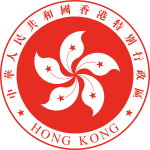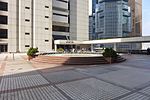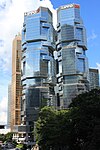Queensway Government Offices
1985 establishments in Hong KongAdmiralty, Hong KongGovernment buildings completed in 1985Hong Kong building and structure stubsOffice buildings completed in 1985 ... and 2 more
Skyscraper office buildings in Hong KongUse Hong Kong English from May 2020

The Queensway Government Office Building is a skyscraper located in the Admiralty district of Hong Kong near Admiralty station. The tower rises 56 floors and 199 metres (653 ft) in height. The building was completed in 1985. It was designed by Mr K.M. Tseng of the Architectural Services Department. The Queensway Government Offices, which stands as the 54th-tallest building in Hong Kong, is a Hong Kong government office building. The roof of the Queensway Government Office Building is adorned with a dragon logo, the symbol of Hong Kong; the structure was added in 2002.
Excerpt from the Wikipedia article Queensway Government Offices (License: CC BY-SA 3.0, Authors, Images).Queensway Government Offices
Supreme Court Road, Hong Kong Island Admiralty (Central and Western District)
Geographical coordinates (GPS) Address External links Nearby Places Show on map
Geographical coordinates (GPS)
| Latitude | Longitude |
|---|---|
| N 22.277777777778 ° | E 114.16388888889 ° |
Address
金鐘道政府合署 Queensway Government Offices
Supreme Court Road
Hong Kong Island, Admiralty (Central and Western District)
Hong Kong, China
Open on Google Maps










